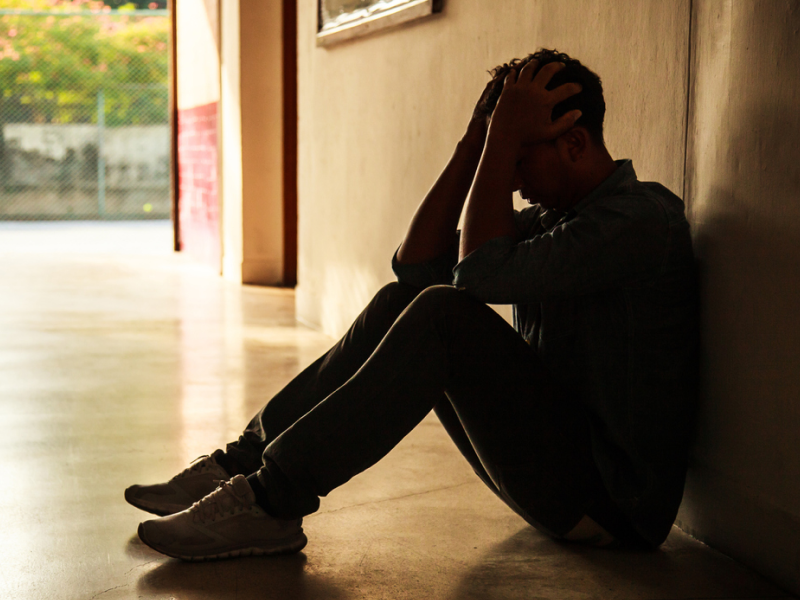
Table of Contents
How Long Does Psychosis Last?
Written By: Charlie Health Editorial Team

Clinically Reviewed By: Sarah Lyter
Updated: September 12, 2025
6 min.
The duration of psychosis varies widely, ranging from a single episode lasting a few days to a chronic condition that persists for months or even years.
Learn more about our Clinical Review Process
Table of Contents
Understanding how long psychosis lasts can be crucial for those experiencing it, as well as for their loved ones and caregivers. Psychosis is a complex mental health condition that affects perception, thoughts, and feelings, often making it challenging to navigate daily life. Psychosis doesn’t look the same for everyone, and knowing its timeline is a big part of recovery.
To give some perspective, about 50 out of every 100,000 people around the world experience psychosis for the first time. For schizophrenia, the number is closer to 15. Those are real lives being affected, each one needing clarity, support, and hope.Below, we will discuss various aspects of psychosis, including its duration and common symptoms. We’ll also explore coping strategies for both during and after a psychotic episode and the role a psychosis therapist plays in healing.

We can help you manage psychosis
Virtual intensive therapy for serious mental health conditions.
Length of different types of psychosis
The duration and severity of psychosis can be affected by factors such as early intervention, treatment adherence, and individual response to medications and therapy. It’s important for people experiencing psychosis to seek professional help for an accurate diagnosis and appropriate treatment.
To understand psychosis better, here’s an overview of several distinct types, plus an explanation of how long each lasts.
1. Brief psychotic disorder
The sudden onset of psychotic symptoms, such as delusions, hallucinations, or disorganized speech, defines this mental health condition. Symptoms last for at least one day but less than one month, often triggered by a stressful event, and usually resolve independently.
2. Schizophrenia
Schizophrenia, a chronic mental health condition, includes symptoms that persist for at least six months and often require ongoing treatment. Schizophrenia can vary in intensity, with periods of exacerbation (acute episodes) and periods of remission.
3. Schizophreniform disorder
Schizophreniform disorder is similar to schizophrenia, but the symptoms last between one to six months. Some people may recover completely, while others may develop schizophrenia.
4. Schizoaffective disorder
Schizoaffective disorder involves symptoms of both schizophrenia and a mood disorder (such as depression or bipolar disorder). The duration can vary, and treatment is often long-term.
5. Psychotic depression
Like schizoaffective disorder, psychotic depression is a condition where psychotic symptoms occur alongside a mood disorder — specifically, major depression. However, psychotic depression differs from schizoaffective disorder because the former doesn’t include concurrent mania, which is one of the primary symptoms of schizophrenia.
Treatment for psychotic depression typically focuses on both the depressive disorder and psychosis.
6. Delusional disorder
Delusional disorder symptoms involve delusions (fixed false beliefs) without other psychotic symptoms. Delusional disorder can vary from a brief episode to chronic, ongoing struggles with fluctuations in intensity.

7. Drug-induced psychosis
Drug-induced psychosis occurs as a result of substance use (such as hallucinogens or stimulants). Duration can vary depending on the substance and individual factors.
8. Postpartum psychosis
This rare and severe mental health condition occurs after childbirth and is characterized by psychotic symptoms such as hallucinations, delusions, severe mood swings, and disorganized thinking. The duration of postpartum psychosis can vary, typically lasting from a few weeks to several months. Prompt medical treatment is essential to reduce the duration and severity of the condition.
What are the symptoms of psychosis?
Psychosis can manifest through various symptoms that affect thoughts, perceptions, emotions, and behavior. According to experts, some common psychosis symptoms include:
- Hallucinations: Seeing, hearing, or feeling things that aren’t actually there. For example, someone might hear voices when no one is speaking.
- Delusions: Strong beliefs that don’t match reality. A person might believe others are spying on them or that they have special powers.
- Disorganized thinking: Thoughts may seem jumbled or hard to follow. This can make speech confusing or difficult to understand.
- Disorganized or abnormal motor behavior: This includes movements that are unusual or don’t make sense, like repeated gestures or being extremely still for long periods.
- Low energy symptoms: These show up as a lack of motivation, low energy, reduced ability to speak, or lack of emotional expression.
- Cognitive issues: Trouble with memory, concentration, or decision-making. Tasks that used to be simple might suddenly feel difficult.
- Social withdrawal: Pulling away from friends, family, and daily activities. The person may isolate themselves or lose interest in social connection.
It’s important to note that the specific psychosis symptoms and their severity can vary widely depending on the underlying cause and individual factors. Early recognition and intervention are crucial for effective treatment and management of psychosis.
Coping strategies during and after psychosis
Coping strategies during psychosis
Coping strategies after psychosis
- Stay calm and safe
- Seek immediate support
- Follow your treatment plan
- Seek consistent support
- Track how you’re doing
- Set realistic goals
During psychosis, people can employ various strategies to manage symptoms and maintain stability.
1. Stay calm and safe
Find a quiet place where you feel secure. For example, turning off the TV and dimming the lights can help reduce sensory overload. Essentially, you want to avoid exposure to stressful or overwhelming stimuli, like crowded places, loud noise, or stressful conversations. If you’re in one of these settings, consider stepping outside for fresh air, or using noise-canceling headphones can help.
You can also try using relaxation techniques, like deep breathing, gentle stretching, or listening to calming music. Some people use guided meditations or keep a calming object nearby, like a soft blanket or stress ball.
2. Seek immediate support
This includes support from a trusted friend, family, or mental health professional. This could mean calling a close friend, texting a family member, or reaching out to a therapist. Having someone listen without judgment can make a big difference.
3. Follow your treatment plan
Take your medication as prescribed and stick to any routines your doctor or therapist suggested. Even something like taking a walk at the same time every day can help ground you.
It’s also helpful to maintain your routine as much as possible. Even small tasks like brushing your teeth or making your bed can bring a sense of structure when things feel chaotic.
After psychosis, implementing specific positive coping strategies can support recovery and prevent relapse.
1. Seek consistent support
Consider therapy and support groups. Talking to a therapist or joining a group where others share their experiences can help you feel less alone and more understood.
You can also build a support network by staying in touch with people who make you feel safe and heard. This could be a sibling, a friend from group therapy, or a mentor who checks in with you.
2. Track how you’re doing
You might use a journal or mood tracker app to notice patterns, like trouble sleeping or feeling disconnected. This helps catch early warning signs.
3. Set realistic goals
Start with simple goals like cooking a meal twice a week or going for a short walk daily. Meeting those goals builds confidence. And if you miss a goal, remember to be kind to yourself. Some days may feel harder than others, and that’s okay. Speak to yourself kindly, the way you’d comfort a friend going through something tough.
Each person’s experience with psychosis is unique, so it’s essential to tailor coping strategies to personal needs and preferences. Seeking ongoing support from healthcare professionals is crucial for long-term management and well-being.
What does a psychosis therapist do?
A psychosis therapist specializes in diagnosing and treating people experiencing psychosis or psychotic disorders.
They begin by conducting thorough assessments to understand the symptoms and causes. Based on this evaluation, they develop personalized psychosis treatment plans that often include therapy, medication management, and crisis intervention. Therapy sessions, such as cognitive behavioral therapy (CBT) and family therapy, focus on reducing symptoms, improving coping skills, and supporting recovery.
The therapist also educates people and their families about psychosis, psychosis treatment options, and strategies for managing symptoms in daily life. This educational component helps empower people and their support networks to participate actively in recovery.
Collaborating with other healthcare providers ensures comprehensive care that addresses all aspects of the person’s well-being and supports long-term recovery.

How Charlie Health can help with psychosis
If a young person in your life is struggling with psychosis, Charlie Health is here to help. Charlie Health’s virtual Intensive Outpatient Program (IOP) provides more than once-weekly mental health treatment for serious mental health conditions, including psychosis. Our expert clinicians incorporate evidence-based therapies into individual counseling, family therapy, and group sessions. With this kind of holistic treatment, managing your mental health is possible. Fill out the form below or give us a call to start healing today.




